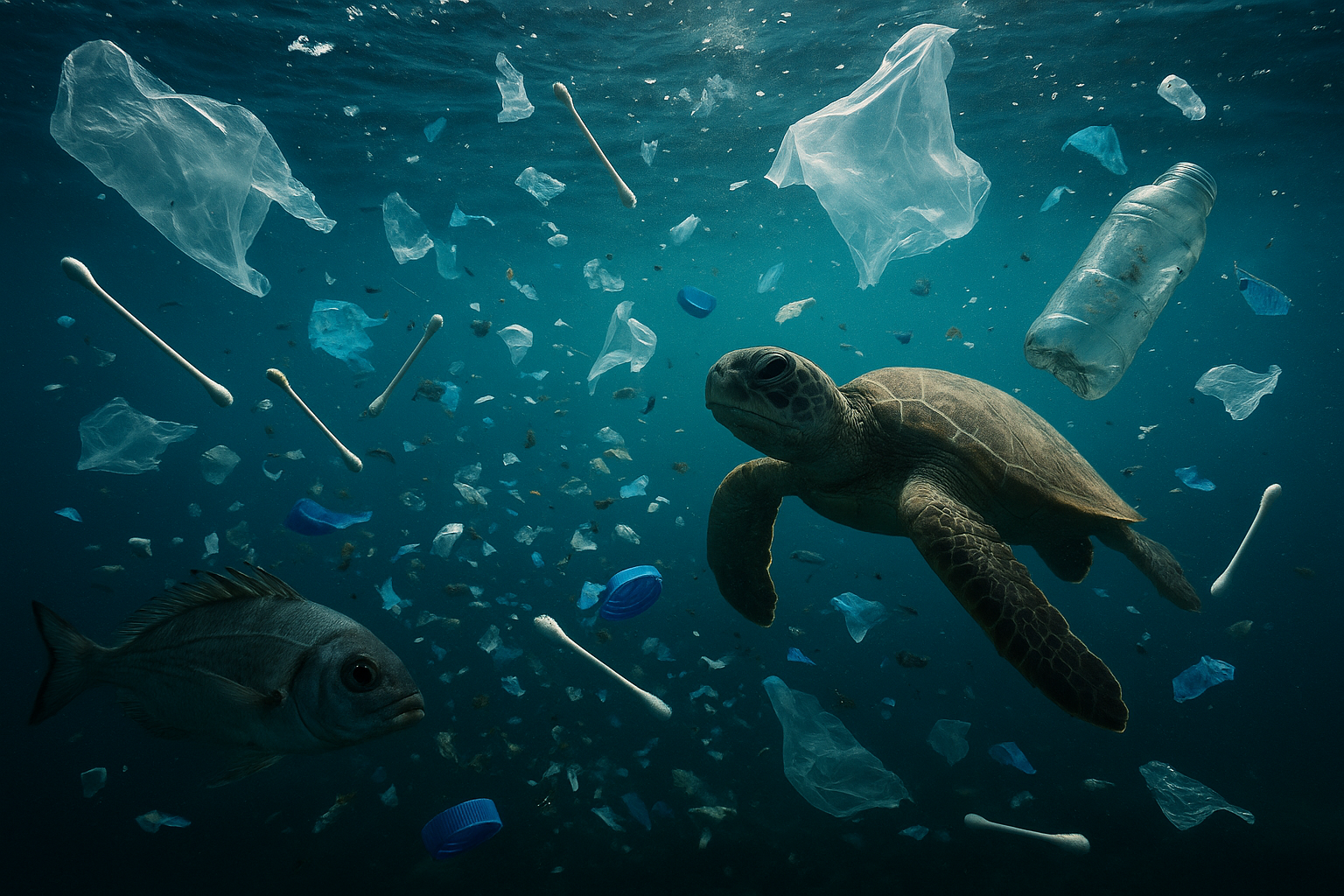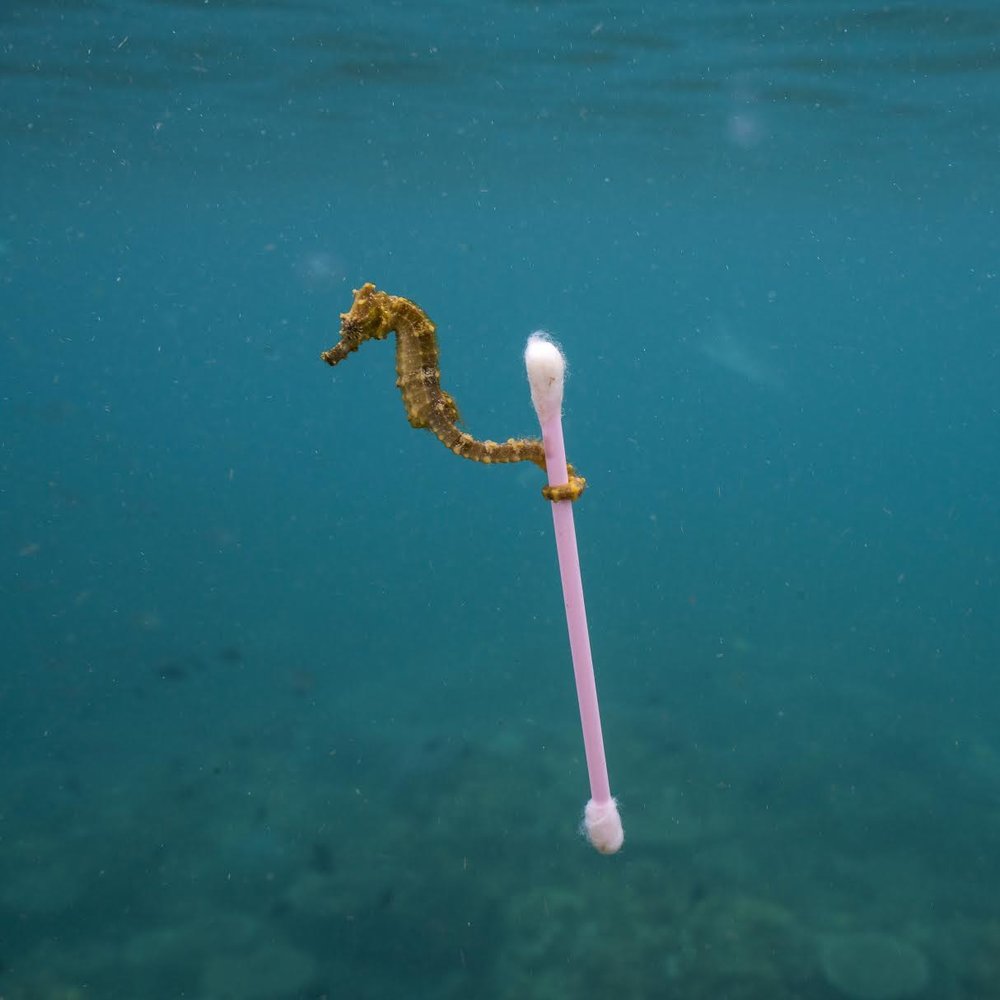
Image alt text: A visual comparison between blue plastic cotton swabs and natural bamboo cotton swabs, with the text “Plastic switch to Natural”.
It’s a small item we use almost every day, but have you ever stopped to think about the impact of your cotton swab? While it may seem insignificant, the massive number of single-use plastic cotton swabs discarded daily creates a huge environmental problem. Plastic pollution is a growing crisis, and every small choice we make can contribute to a solution.
This article will help you make an informed decision. We’ll explore the hidden costs of plastic Q-tips, the benefits of bamboo buds, and compare them side-by-side. By the end, you’ll understand why switching to a greener alternative is not just good for the planet, but also for you.
Here’s what we’ll cover:
- The Hidden Costs of Plastic Q-tips: Discover the environmental impact of plastic swabs.
- Bamboo Buds: Natural, Safe, and Green: Learn about the sustainable alternative.
- Side-by-Side Feature Comparison: A direct comparison of features.
- Use Cases: Which swab works best for different applications?
- Expert and User Opinions: What others are saying about the switch.
- Conclusion: Why making the switch is the right choice.
Plastic Q-tips: The Hidden Costs

Image alt text: A photorealistic image of a sea turtle swimming in a polluted ocean filled with plastic waste, including plastic cotton swabs, bottles, and bags, highlighting the impact on marine life.
Plastic cotton swabs are a perfect example of a product designed for convenience without considering the long-term consequences. They are used for a few seconds and then thrown away, but their journey doesn’t end there. Here’s a look at the hidden costs of using plastic Q-tips.
The Problem with Plastic
Plastic is a durable material, which is great for many applications, but terrible for single-use products. Most plastics, including those used in cotton swabs, are not biodegradable. This means they don’t break down and decompose naturally. Instead, they persist in the environment for hundreds of years, breaking down into smaller and smaller pieces called microplastics.
The numbers are staggering. According to research, billions of plastic cotton swabs are produced and discarded every year worldwide. In the UK alone, an estimated 1.8 billion plastic cotton buds are used annually. These small items may seem insignificant individually, but their collective impact is enormous. When you multiply this by the global population, the scale of the problem becomes clear.
The plastic used in cotton swabs is typically polypropylene or polystyrene, both of which are petroleum-based materials. The production of these plastics requires fossil fuels and releases greenhouse gases, contributing to climate change. The manufacturing process also involves various chemicals that can be harmful to both human health and the environment.
Ocean Pollution and Harm to Wildlife
Because of their small size, plastic cotton swabs often slip through wastewater treatment systems and end up in our rivers and oceans. They are one of the most common items found during beach cleanups. Once in the ocean, they pose a serious threat to marine life. Animals can mistake them for food, leading to internal injuries and starvation. The heartbreaking images of a seahorse clinging to a plastic cotton swab are a stark reminder of the damage these seemingly harmless items can cause.
Research shows that plastic cotton swabs are among the top 10 most commonly found items on European beaches. The Marine Conservation Society’s Great British Beach Clean found cotton bud sticks on 71% of the beaches surveyed. These items don’t just stay on the surface; they sink to the ocean floor, where they can persist for decades.
The impact on marine wildlife is devastating. Sea turtles, seabirds, and fish often mistake plastic debris for food. When ingested, plastic can block digestive systems, leading to malnutrition and death. Even if the animal survives, the plastic can leach toxic chemicals into their bodies, affecting their health and reproductive capabilities. Studies have found plastic particles in the stomachs of marine animals ranging from tiny plankton to large whales.
The problem extends beyond individual animals. Plastic pollution disrupts entire marine ecosystems. Microplastics enter the food chain at the lowest levels and bioaccumulate as they move up, eventually reaching human consumers of seafood. This creates a cycle where our waste ultimately comes back to affect our own health.

Image alt text: A seahorse clinging to a pink plastic cotton swab in the ocean, a powerful image illustrating the impact of plastic pollution on marine wildlife.
A Throwaway Culture
The very nature of plastic Q-tips promotes a throwaway culture. They are designed to be used once and then discarded, contributing to the massive amount of waste we generate every day. This single-use mindset is unsustainable and puts a strain on our planet’s resources.
Bamboo Buds: Natural, Safe, and Green

Image alt text: A lush green bamboo forest with tall bamboo stalks and sunlight filtering through the leaves, representing a sustainable and renewable resource.
In contrast to the environmental problems caused by plastic, bamboo cotton swabs offer a natural, safe, and green alternative. Here’s why bamboo buds are the superior choice.
A Sustainable and Safe Material
Bamboo is one of the most sustainable resources on the planet. It’s a type of grass that grows incredibly fast, and it can be harvested without killing the plant. This means it can be continuously regrown, making it a truly renewable resource. Unlike plastic, bamboo is 100% biodegradable, so it will break down naturally without harming the environment.
The sustainability credentials of bamboo are impressive. Some species of bamboo can grow up to 3 feet in a single day, making it one of the fastest-growing plants on Earth. It reaches maturity in just 3-5 years, compared to hardwood trees that can take 25-50 years. Bamboo also produces 35% more oxygen than equivalent stands of trees and can sequester up to 12 tons of CO2 per hectare per year.
From an agricultural perspective, bamboo requires no pesticides or fertilizers to grow, and it helps prevent soil erosion with its extensive root system. When harvested, the root system remains intact, allowing the plant to regenerate without replanting. This makes bamboo cultivation much more sustainable than traditional forestry or plastic production.
Bamboo is also a very safe material. It has natural antimicrobial properties and is strong yet flexible. This flexibility is a key safety feature, as it prevents the swab from snapping and causing injury, especially when used for delicate tasks. The tensile strength of bamboo is comparable to steel, yet it maintains enough flexibility to bend without breaking under normal use.
Beautiful and Eco-Friendly
Let’s be honest, bamboo just looks better. The natural wood grain of a bamboo stick has a simple, elegant aesthetic that plastic just can’t match. It’s a small touch of nature you can bring into your daily routine. By choosing bamboo, you are making a conscious decision to reduce your plastic consumption and support a more sustainable lifestyle.
The SwabMasters Commitment
At SwabMasters, we are committed to providing high-quality, eco-friendly products. That’s why we’ve embraced bamboo as a key material for our cotton swabs. We believe in responsible manufacturing, and our vertically integrated process ensures that we have complete control over the quality of our products, from the raw materials to the finished swab. Our bamboo buds are not only better for the planet, but they are also made to the highest standards of quality and safety. We take pride in our craftsmanship and our commitment to sustainability, and we believe that you will feel the difference.
Our manufacturing process reflects our commitment to quality and sustainability. We source our bamboo from certified sustainable farms that practice responsible harvesting methods. The bamboo is carefully selected for optimal strength and flexibility, ensuring that each swab meets our rigorous quality standards.
Our cotton tips are made from 100% pure cotton, with no synthetic fibers or chemical additives. We use advanced carding technology to create cotton sliver that is soft, absorbent. The cotton is securely attached to the bamboo stick using food-grade adhesives that are safe for all applications.
Quality control is paramount in our manufacturing process. Each batch of swabs undergoes multiple inspections to ensure consistency in size, shape, and performance. We test for tensile strength, cotton adhesion, and overall durability to guarantee that our products meet the highest standards. This attention to detail is what sets SwabMasters apart from other manufacturers and ensures that our customers receive a superior product every time.
Side-by-Side Feature Comparison

Image alt text: A side-by-side comparison of bamboo cotton swabs and plastic cotton swabs on a white background, highlighting the visual difference between the natural bamboo and white plastic sticks.
To make the choice even clearer, here’s a direct comparison of the key features of plastic Q-tips and bamboo buds:
| Feature | Plastic Q-tips | Bamboo Buds |
|---|---|---|
| Biodegradable | ❌ | ✅ |
| Recyclability | ❌ | ✅ |
| Cost | ✅ (cheap) | Slightly higher |
| Safety | ❌ (may break) | ✅ (flexible and strong) |
| Aesthetic | ❌ | ✅ (natural and elegant) |
Understanding the Cost Difference
While bamboo cotton swabs may cost slightly more upfront than their plastic counterparts, it’s important to consider the total cost of ownership. The price difference is typically minimal – often just a few cents per swab – but the value proposition is significantly different.
When you factor in the environmental costs of plastic production, disposal, and cleanup, bamboo swabs actually represent better value for money. The hidden costs of plastic pollution include marine ecosystem damage, wildlife rescue and rehabilitation, beach cleanup efforts, and the long-term health impacts of microplastics in our food chain. These costs are ultimately borne by society as a whole.
Furthermore, the superior quality and durability of bamboo swabs mean they often perform better than plastic alternatives. Users frequently report that bamboo swabs are less likely to break during use, reducing waste and the need for multiple swabs to complete a task.
Use Cases: Which One Works Better For…
When it comes to performance, you might be surprised to learn that bamboo swabs often outperform their plastic counterparts. Let’s look at a few common use cases.
Makeup Application and Correction
For makeup artists and beauty enthusiasts, precision is key. A flimsy cotton swab can ruin a perfectly winged eyeliner in an instant. Bamboo swabs offer superior stability and a firmer hold, making them ideal for precise makeup application and correction. The strong, yet flexible bamboo stick won’t bend or break under pressure, giving you the control you need for a flawless finish.
Cleaning Your Ears
Disclaimer: It is generally not recommended to insert cotton swabs into your ear canal. Doing so can push earwax further in and potentially cause damage. However, for cleaning the outer ear, a safe and reliable swab is essential. The flexibility of bamboo is a major advantage here. It provides gentle feedback and is less likely to snap than brittle plastic, reducing the risk of injury. The 100% pure cotton tips on SwabMasters bamboo buds are also soft and absorbent, ensuring a gentle and effective clean.
Travel and Portability
When you’re on the go, you need products that are convenient and reliable. Bamboo swabs often come in eco-friendly, compact packaging that is perfect for travel. The sturdy construction of bamboo swabs also means they are less likely to get crushed or damaged in your bag. Plus, you can feel good knowing that you’re making a sustainable choice even when you’re away from home.
What Do Experts and Users Say?
Don’t just take our word for it. Here’s what sustainability experts and everyday users are saying about making the switch to bamboo cotton swabs.
Expert Opinion
According to Dr. Jane Goodall, a renowned primatologist and environmentalist, “Every single individual makes an impact on the planet every single day. We have a choice as to what kind of impact we make.” This sentiment is echoed by many sustainability experts who advocate for reducing our reliance on single-use plastics. Choosing bamboo cotton swabs is a simple yet powerful way to make a positive impact.
User Feedback
Here are a few snippets of what our customers have to say:
“I was hesitant to switch from my usual plastic swabs, but I’m so glad I did! The bamboo swabs from SwabMasters are so much sturdier and I feel great knowing I’m not contributing to plastic pollution.” – Sarah K.
“The quality of these bamboo swabs is amazing. The cotton tips are so soft and they don’t fall apart like some other brands I’ve tried. I’m a customer for life!” – Mark T.
“I love the simple, natural look of the bamboo swabs. It’s a small thing, but it makes my daily routine feel a little more special. And of course, it’s great to know I’m making a better choice for the environment.” – Emily L.
Conclusion: Partner with SwabMasters for Sustainable Solutions
The evidence is overwhelming. From regulatory compliance to consumer demand and environmental responsibility, bamboo cotton swabs represent the future of the industry. For businesses, brands, and procurement professionals, the question isn’t whether to make the switch, but when and with whom.
As a professional cotton swab manufacturer with vertically integrated production capabilities, SwabMasters is uniquely positioned to support your transition to sustainable alternatives. Our bamboo cotton swabs offer superior quality, consistent performance, and the environmental credentials your customers increasingly demand.
Why Choose SwabMasters as Your Manufacturing Partner:
- Vertically Integrated Production: Complete control from raw materials to finished products ensures consistent quality and reliable supply chains
- Customization Capabilities: Tailored solutions for your specific requirements, from packaging to cotton tip specifications
- Regulatory Compliance: Our products meet international standards and help you stay ahead of evolving regulations
- Scalable Manufacturing: From small batch orders to large-scale production runs, we have the capacity to meet your needs
- Sustainability Leadership: Position your brand as an environmental leader with our eco-friendly alternatives
Ready to discuss your sustainable cotton swab requirements? Contact our B2B sales team to explore custom solutions, bulk pricing, and partnership opportunities. Let SwabMasters help you meet your sustainability goals while maintaining the quality your customers expect.
Contact Our B2B Sales Team at swabmasters.com
The Regulatory Landscape and Future Trends
The shift away from plastic cotton swabs isn’t just a consumer preference – it’s becoming a regulatory requirement in many parts of the world. The European Union has banned single-use plastic cotton buds as part of its Single-Use Plastics Directive, which came into effect in 2021. Similar legislation is being considered or implemented in other countries as governments recognize the urgent need to address plastic pollution.
This regulatory trend reflects growing scientific evidence about the environmental impact of single-use plastics. Studies have shown that plastic cotton swabs are among the most problematic items in terms of marine pollution, due to their size, shape, and the way they are typically disposed of. Many are flushed down toilets, bypassing waste management systems entirely and going directly into waterways.
The business case for sustainable alternatives is also becoming stronger. Companies that proactively switch to eco-friendly products are positioning themselves ahead of regulatory changes and meeting growing consumer demand for sustainable options. This trend is particularly pronounced among younger consumers, who are increasingly making purchasing decisions based on environmental considerations.
Making the Switch: Practical Considerations
If you’re ready to make the switch to bamboo cotton swabs, here are some practical tips to ensure a smooth transition:
Start Small: Begin by purchasing a small pack of bamboo swabs to test them out. Most users find the transition seamless, but it’s always good to try before committing to larger quantities.
Storage: Bamboo swabs should be stored in a dry place to maintain their integrity. Most come in moisture-resistant packaging that helps preserve quality.
Disposal: One of the great advantages of bamboo swabs is that they can be composted. If you have a home compost system, you can add used swabs directly to your compost bin. If not, they can go in your regular trash, where they will biodegrade much faster than plastic alternatives.
Cost Management: While bamboo swabs may cost slightly more, buying in bulk can help reduce the per-unit cost. Many suppliers offer discounts for larger quantities, making the switch more economical.


